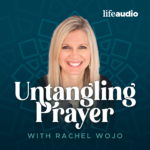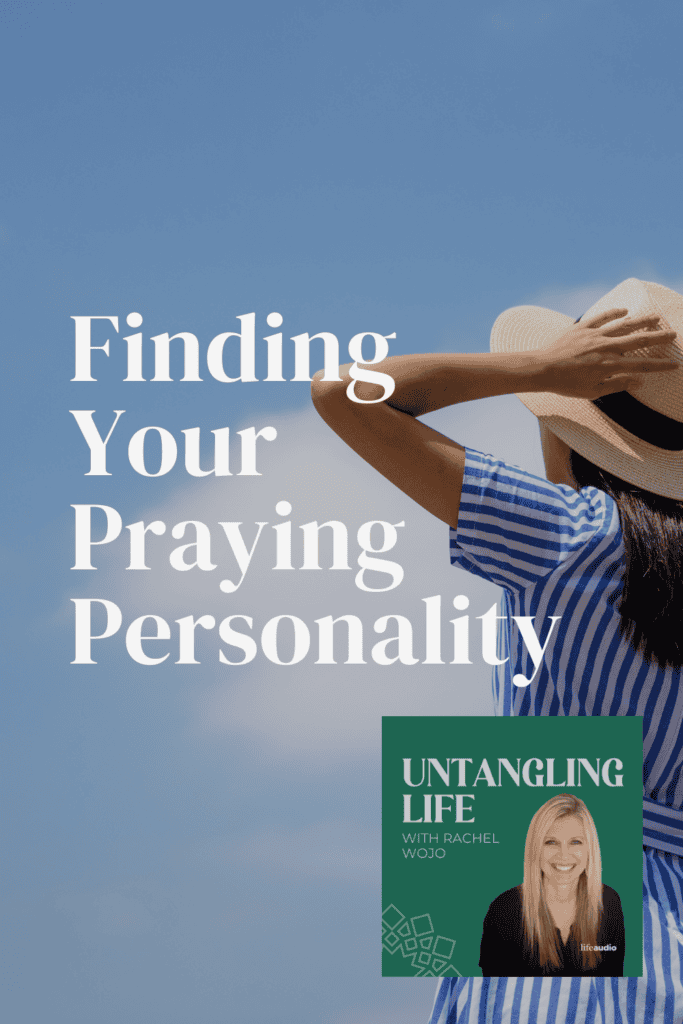

Prayer can be a struggle when you’re unsure how to communicate with God. Every person in the Bible communicated with their Creator a little differently.
What is your “praying personality,” and how will knowing it help you grow closer to God?
Author Janet McHenry answers these questions in her interview with Rachel on today’s episode. You don’t want to miss it!
RESOURCES
Praying Personalities: Finding Your Natural Prayer Style
The Praying Personalities Quiz
TRANSCRIPT
Well, thank you so much for joining me today. I’m Rachel. And today I have a wonderful guest. Her name is Janet McHenry and she has written a beautiful book called Praying Personalities for all of You who are listening, maybe for the first time. I love to talk about prayer. And I feel like if you could have a prayer expert, although we’re not really labeling anyone a prayer expert, but if you could have one, you might just call on Janet Jan. Thank you so much for being here today.
Rachel, it really is a privilege. Thank you.
I was thinking I know you have a very deep heart for prayer and one of my favorite things that I read about your prayer life and the emphasis that you put on prayer is that there is no one-size-fits-all. Kind of prayer. And I really tucked that away deep into my heart because I know that to be true. I have lived it to be true. But could you share a little bit more from your perspective about the meaning behind that statement that there’s no one-size-fits-all kind of prayer?
Right. It was really. I felt like some an idea that got dropped into my heart couple years ago. And I said God. Show me that this is true, and so I already had a practice of reading through God’s word every year, so I thought this year I’m going to comb the Bible for anything that I see in terms of how different biblical people. Approach. God, I looked at, you know, the kinds of prayers that they prayed and their situations and the context of all that. That, and I thought that, wow, biblical people really prayed in different ways, and I saw that in the the life of Moses, for example, where, you know, God has called in to lead the Israelites out of Egypt, out of captivity. And, you know, he has a half a dozen arguments with God as to. Exactly why he cannot do that. And yet God still worked with Moses. And then I saw in the life of Hannah, you know, that in first Samuel 1, she’s crying out to God. I can’t have a child and. You know, she’s just desperate, you know, and we hear the angst in her voice, not the anger or frustration such as Moses and. And then in the very next chapter, we see this beautiful song that she sings, you know, and I thought she approached God in emotional kind of ways. And I think that we can, as we read God God’s word, we find that affirmation that we too can pray in the way that God has created us. Each of us has a different personality. And so God knows that we don’t have to pretend to be like our best friend. We don’t have to necessarily model the way someone in in our church, small group praise. We can just pray as our heart leads us.
Yeah, I love that so much. I grew up in church, so I have many thoughts on the various prayer styles that I encountered, even as a child. You know, as a child, you’re absorbing everything all around you and. And I just remember there was a sweet woman who would sit quietly in the back, and I can still picture her. And then there was an elderly gentleman who yelled his prayer, probably because he couldn’t hear himself. But that was just a part of who he was. And then the usher at the offering who would nervously insert. Of the and a thou every other word, because he just repetitively say. Oh Lord, oh Lord. And I just remember thinking, you know what God hears every one of those prayers. It did not matter about how they were speaking or the words they were saying so much as the fact that they were going to God in prayer. But there are. Rare personalities. What do you think? What effect? Have you noticed that our church and our family backgrounds have on prayer?
Yes, I think that, you know, depending on what our cultural background has been, what our, you know, family church experience has been the generation in which we’ve grown up, you know, can all influence the ways that we perceive how prayer is done. You know, for example even. My sister and her husband and her family. Only whenever they say grace or they’re praying for someone, they put their hands together and you know they hold their hands against their chest. And it’s that’s just a practice they have. I even have seen that in their sons and their sons children as well. It’s just what they do. And I grew up in a traditional church that had a high literal. Gee, and, you know, growing up in that kind of way, I thought prayers were things that you memorized and you said, and that was all well and good, you know, and certainly we all say the Lord’s prayer, right. He, you know, he gave that to us as a model prayer. But eventually I learned that prayer really helps. To you know, communicate my relationship with the Lord. And so I think that God accepts us no matter what kind of experience we’ve had, no matter how we view prayer, we see again all kinds of different kinds of prayers in the Bible. So.
Yes.
It you know, really. Doesn’t matter and I think it just as if we’re in a like a small group setting and we have different generations there. 3-4, maybe different generations. That you’ll just notice there are different ways that people pray, and all of that is well and good.
Yes, yes, it’s so good. So I do think accepting our own family background or cultural experiences is important when we approach prayer and just recognizing that we may be influenced in one way or another and that’s OK that’s all a part of the fabric.
Yeah.
That God has weaved into our life. Hives, but we still have access to him no matter what. I mean. That is the beautiful thing. Now you’ve written this new book, praying personalities. And the reason I wanted to talk about it is because I’m an extroverted introvert and some people are like, what does that really mean? Well, it means I can be on it. I love to stand on a platform and. To speak, I do enjoy talking on the podcast, the radio. I do enjoy what some would say are more extroverted activities, but by being an introvert, my internal wiring is that I have to recharge by being alone and a lot of people recharge. By being with others like, they get a, you know, charge. They get strength from being with others, but I get more strength in solitude in finding some time to just be alone. And a lot of times it’s being alone with God. And so, what effect does this extroverted introvert kind of way of thinking and way of operating? What effect does that kind of personality have on having a prayer life? And why is it important for me to understand that connection?
I think that the extrovert introvert factor definitely will play out in communal kind of settings. You know, the extroverted mom may just thrive in that setting in the home where she gathers all the children and it’s the favorite part of her day, you know, because they are going to sort of build into her, you know, this, that excitement, you know, whereas the, you know, the introverted. Mom may just rather, you know, just one-on-one, you know, pray with her child in their room and in the end. Meetings. If we’re in social kinds of settings. Typically, your leader of your Bible study is going to be probably someone who’s more extroverted in nature, and so she probably could think ahead of time like ohh, you know, Susie over here is such a darling or a girl. And I want to encourage her. To pray. So, I’m goanna call on her. But The thing is that is just going to make that little Susie so nervous to be called on like that. And just to have to perform, you know. But if she called Susie ahead of time, you know, like the the day before and said, hey, would you be willing to close us in prayer tomorrow night in small group? Ah, you’ve prayed with me, and I I’d love to hear that, the way that you build others up in the way that. Pray that will just, you know, give her that kind of a cue that will make her have more of a a sense of covert comfort in that setting. So yeah, I think it. I think it’s really been helpful as I’ve, you know, kind of studied personalities to think of that and the demands that I’ve had. Made on me the demands that I make on others, you know, to think ahead of time in terms of how best would. This kind of sync with someone’s God-given personality.
I love that so much, Janet. I do think it’s important and that fosters growth that nurtures that individual and gives them a way to prepare themselves and to step into a more formal prayer setting where they feel like they’re connecting with God in front of others. And that feels so intimate to do. You you’ve written this beautiful book on praying personalities, and I talk a lot on the podcast about keeping open communication with God, not just once or twice a day, but throughout the day. I emphasized that. How does knowing your prayer personality or your prayer personality? Help you stay more connected to God throughout the day.
I think once we have a sense of who we are, how God has created us, what our unique personality is, then we there’s a freedom in that and that we can recognize that some ways of praying are going to be more natural for us than other kinds of ways. For example. I have high levels of energy and it’s very difficult for me to sit still. I love short chapters and books and things like that. But so, for me the most natural kind of prayer that I’ve discovered has been prayer walking, and that’s a practice that I’ve been doing for my community and myself for the last 25 years because I can get good exercise. I’m doing that, but I also can intercede for whatever God puts within my eyesight, and that’s just become a natural kind of a practice for me, whereas. For someone else you know, they might find that you know they just love putting on worship. Music and dancing throughout the house, so you know they’ve got it blaring all day long as you know as you’re doing the tasks that you just need to do. But that’s not me. I had a friend recently who said, you know, chat what you should do is, you know, put on that worship music and Just Dance. But, but that’s just not a natural kind of thing that I want to. Do.
Hmm.
And then there are others who you know, they’re just simply more disciplined. They have, they love organizational systems. And so yeah, prayer, journaling or annotating prayers in their Bible or having different kinds of lists, maybe a notebook. That has or even spreadsheets. I heard of someone who has spreadsheets, a prayer list.
Hey, if that suits you, if that suits you and that’s what works, I’m all for it. So, I feel like what you’re saying is that when we recognize how God has wired us, then it opens up that opportunity for us to understand how to communicate best with him.
And.
Absolutely yes.
Yeah. I appreciate that so much. You’ve created this incredible tool. It’s just, it helps us discover our praying personalities because when we say that we’re that phrase, praying personalities, it may seem like, well, what does that really mean? How do I identify where I fit in that? How can that help me open up? My channel of communication with God, so I would love for you to share with us more about this tool that can fuel our prayer lives.
I worked with a company that helped me establish the praying personalities quiz and it’s online for people. And it’s also in the book. And eventually it leads the reader to a place where she finds out whether she is a problem solver, and that’s how I identify. You know, I love to have specific reminders to pray. I love to solve problems. Eventually, in my own life, I’ve learned to turn to God to solve those problems, and prayer is the the best problem-solving strategy that we can have. But then there are a couple of other personalities as well. The friend of God, this is a highly social person who just loves praying and in large settings. Then the organized prayer or like also call her the lamenter. This person is having kind of a a real heart, a sensitive heart for God. Has discipline practices in place already and so be natural for her to be to have that prayer notebook or some other kind of system to pray? And then the last is the peace seeker and the peace seeker seeks out prayer for the purpose of peace. She needs that kind of sense of calm in her life. She’s highly introverted in nature, and perhaps even she might appreciate prayer books, for example, to kind of jumpstart. Your prayer life. So, here is just some. Of the the just very basic ideas behind the the four praying personalities.
I love that now the tool the personalities are included in the book and really described well and just help you journey through understanding and opening up that communication. But I also know that you have an online tool. What is the link address for that? Because I know listeners are going to want to grab that.
It’s at praying personalities.com and it’s a simple tool that examines kind of your life, your perspective, your personality and spiritual practices, and provides you eventually and you know, if you look into the book into. There are hundreds of different kinds of ways that you could pray in a natural way.
I love that so much. Thank you for creating this incredible resource for us to expand our prayer lives. Stan it. I’m so honored that you would hope on and share this with our listeners today. For everyone listening, I’ll be sure to include this link in the show notes. And where else can our listeners reach you? Net.
Anywhere on social media or at janetmchenry.com.
Awesome. Awesome. Thank you so much. Well, I would love it. It feels appropriate. If I would ask you to close out in prayer today and just pray a blessing over our listeners. Thank you for being with us, for honoring us. With this great tool I know so. And if our listeners are going to want to grab it, but would you pray for those who are just trying to figure this out, they want to draw closer to God in prayer and they would love to take you up on this tool. But I think praying for them could be an awesome way to close out the episode.
I’d be happy to do that. Rachel. Father, thank you so much for the desire for us to come to you and to communicate with you. We thank you for this ability to just open our hearts, open our minds, our souls to you, and that we can recognize that the wonderful thing about prayer as Corey, 10 Boom said is that we leave this world, this world of ours, where we think we cannot do something. That something will not happen, and we enter your realm where everything is possible. We thank you, Lord, that prayer is more about access than about answers, and that your heart for us is that we truly develop this relationship with you so that we become people who see prayer as something natural in our lives. And it’s not something that’s a last resort. But it that it’s a first response in Jesus’ name, Amen.
Amen. Amen. Thank you all so much for listening today. And until next time, just remember, God sees you and knows your need.

